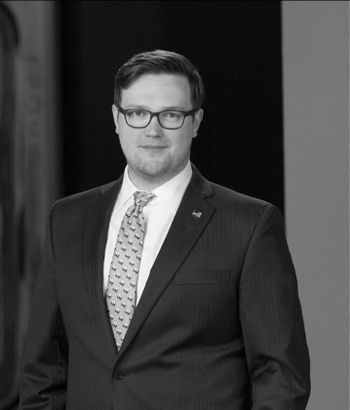Student criticizes UChicago Medical School for program that excludes White students
Daniel Schmidt, a sophomore at the University of Chicago, recently criticized the university for its medical school’s “Underrepresented in Medicine Visiting Clerkship Program” (UiMVCP).
Schmidt told Campus Reform that he is the "only right-leaning student" speaking out against the program.
Daniel Schmidt, a sophomore at the University of Chicago (UChicago), recently criticized the university for its medical school’s “Underrepresented in Medicine Visiting Clerkship Program“ (UiMVCP).
In his Aug. 22 op-ed, Time to Fight Anti-White Racism on Campus, Schmidt argued that the program discriminated against White students and “violates Title VI of the Civil Rights Act, which prohibits any institution that receives federal funds from discriminating based on race.”
Co-sponsored by the UChicago Committee on Diversity and Inclusion, UiMVCP acts as a supplement to the campus’ regular Visiting Clerkship program. It offers fourth-year medical students mentoring and networking opportunities within the UChicago community, including exclusive access to faculty.
Furthermore, the program seeks to alleviate financial burdens incurred in rotation participation by providing a $2,000 stipend upon program completion, which takes four weeks to complete, according to the program’s website.
Successful candidates of the program then receive special consideration for internships and residencies at UChicago Medicine.
The application requirement, however, excludes White candidates from applying.
Instead, applicants must fall under an underrepresented category, including Black/ African American, Hispanic/ Latinx, Native American, American Indian, Alaskan Native, Native Hawaiian, and Asian, according to the program’s website.
Schmidt is not the only person to discover this discriminatory program, however.
The Foundation Against Intolerance & Racism (FAIR), a civil rights nonprofit based in New York, also caught wind of the program.
The nonprofit, in fact, submitted a letter to UChicago Medical School Dean Vineet Arora, MD on July 12 saying that as an “organization committed to pro-human antiracism, FAIR supports efforts to achieve greater fairness and advance worthy initiatives in medical education.”
“[It believes], however, that establishing funding opportunities based on skin color or ancestry, as the URiMVCP does, violates Title VI of the Civil Rights Act,” the letter continued.
FAIR also called out UChicago for violating its own diversity policy, which “aims to enable all people, regardless of identity, background, or institutional position, to thrive, realize their capabilities, engage meaningfully in institutional life, and contribute to the vibrant University community.”
Dean Arora responded to FAIR on Aug. 5, stating that she was working to update the “materials to ensure compliance with the law.”
6 days later, FAIR published an update on its site entitle FAIR News: Success at the University of Chicago, noting that Dean Arora responded to their letter.
The Dean’s response, however, is all FAIR has received.
In an email to Campus Reform, FAIR concurred that the school has yet to change the application requirements.
While there is a checkbox labeled “White” on the application form, its website still states that the initiative will largely support what it calls “traditionally underrepresented” students.
What is more, the application not only allows medical students to register using “They/them/their” pronouns but also requests applicants to explain their ethnicity if they do not first identify as “Hispanic or Latinx.”
As a result, FAIR sent Dean Arora “a follow-up letter asking for the timeline in which she expects the [application] to be updated,” FAIR’s Staff Attorney Leigh Ann O’Neill told Campus Reform.
Anti-White discrimination is commonplace at UChicago, Schmidt argues. White students are afraid to speak out against these discriminatory programs for fear of being called racist.
But “silence is surrender,” according to Schmidt.
Pointing to Black Lives Matter activists who, as Schmidt puts it, have built a dedicated resistance to discriminatory policies against black students, Schmidt called on White students to persistently demonstrate as well.
“If white students care about being treated with the same dignity as everyone else and about being afforded the same opportunities, then they must be willing to demonstrate the same kind of dedicated resistance that others have shown,” his op-ed reads.
[RELATED: EXCLUSIVE: Virginia Tech syllabus apologizes for instructor’s White skin]
Responding to Campus Reform’s questions regarding the application, Schmidt noted that he believes to be the only conservative on the UChicago campus speaking out against the clerkship’s anti-White requirements.
”[T]he leading conservative student organizations at UChicago... have been silent about this. To my knowledge, I’m the only right-leaning student at my college raising awareness of this illegal policy,” he told Campus Reform. “If even conservative students say nothing about anti-white discrimination (likely because they’re afraid they’ll be labeled ‘racist’ for talking about it), then what hope remains?”
UChicago is not alone in its implementation of anti-White policies. Anti-White discrimination has been commonplace at universities across the country.
Campus Reform recently reported that off-campus housing near the University of California, Berkeley banned White students from house common spaces.
The house, dubbed, the “Person of Color Theme House,” was created to provide a “safe environment for people who identify as People of Color.” The house rule book includes rules requiring tenants to warn each other before inviting a White guest.
In another example from late last year, Northeastern University and Boston College “explicitly prohibited white students from competing” in the American Parliamentary Debate Association’s tournament, according to Campus Reform’s Amanda Mayer.
UChicago was involved in this incident as well as it kept White students from participating in the tournament.
The Chicago Debate Society President Devesh Kodnani, wrote that the “goal of this tournament is to promote affinity among non-white APDA debaters and cultivate racial diversity on the league.”
Campus Reform contacted Dean Vineet Arora, MD for comment, but she has yet to respond. This article will be updated accordingly.
Follow @J_Gould_ on Twitter.

